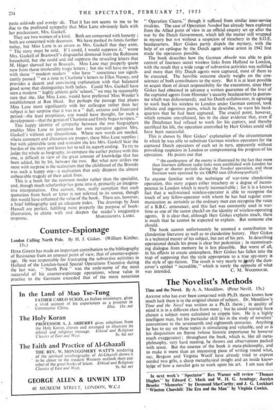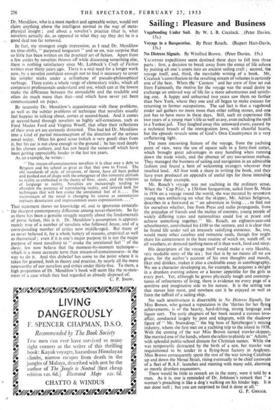The Novelist's Methods
Time and the Novel. By A. A. Mendilow. (Peter Nevill. 15s.) ANYONE who has ever been concerned with Ph.D. theses knows how much luck there is in the original choice of subject. Dr. Mendilow's Time and the Novel was written as a Ph.D. thesis ; in quality of mind it is in a different class from most ; but he could scarcely have chosen a subject more calculated to cripple him. He is a highly intelligent man, but his particular skill lies in the study of novelists' conventions in the seventeenth and eighteenth centuries. Anything he has to say on these topics is stimulating and valuable; and so is his disquisition on Sterne (whose historic importance he however much exaggerates) ; throughout the book, which is, like all meta- philosophy, very hard reading, he throws out observations packed with sense. But the essence of the book is meta-philosophy, and to make it more than an interesting piece of writing round what, say, Bergson and Virginia Woolf have already tried to express needed two gifts, a sharp metaphysical insight and an inside know- ledge of how a novelist gets to work upon his art. I am sure that Dr. Mendilow, who is a most modest and agreeable writer, would not claim anything above the intelligent normal in the way of meta- physical insight ; and about a novelist's practice (that is, what novelists actually do, as opposed to what they say they do) he is a good deal too far removed.
In fact, my strongest single impression, as I read Dr. Mendilow on time-shifts, " purposed longueurs " and so on, was surprise that so little has been written on the practical art of fiction. Apart from a few asides by novelists thrown off while discussing something else, there is nothing satisfactory since Mr. Lubbock's Craft of Fiction written over thirty years ago. There is a real need for a longer work now, by a novelist confident enough not to find it necessary to cover his simpler tricks under a cellophane of pseudo-philosophical verbiage. There exists a whole range of elementary tricks, which all competent professionals understand and use, which can at the lowest make the difference between the unreadable and the readable and often do much more than that—and which have never yet been communicated on paper.
By necessity Dr. Mendilow's acquaintance with these problems, as well as the subtler problems of technique that novelists usually feel happier in talking about, comes at second-hand. And it comes at second-hand through novelists so highly self-conscious, such as Ford Madox Ford and Virginia Woolf, that often their reflections of their own art are curiously distorted. This had led Dr. Mendilow into a kind of partial misconception of the direction of the serious novel today. Often his good sense (which is very good) shies from it, but his ear is not close enough to the ground ; he has read deeply in his chosen authors, and has not heard the noises-off which have been getting appreciably louder in the last ten years.
As an example, he writes :
" The stream-of-consciousness novelists it is clear owe a debt to Bergson and his school as great as that they owe to Freud. The old standards of style, of structure, of theme, have all been pulled and pushed out of shape with the emergence of this romantic attitude to reality as embodied in the theory of flow, duree, and the relation of language to reality. Novelists are increasingly tending to abandon the pretence of reproducing reality, and instead look for techniques that will best evoke the unrational feel of it.... The mainstream of the novel is changing Its course as connotation replaces denotation and impressionism ousts expressionism...."
That statement shows no knowledge of, and in ignorance conceals' the sharpest contemporary difference among novel-theorists. So far as there has been a genuine struggle recently about the fundamentals of prose fiction, this is it. Dr. Mendilow's assumption is approxi- mately true of a number of novelists who followed Joyce, and of a corresponding number of critics now middle-aged. But many of us never believed it, for a whole battery of reasons, empirical as well as theoretical ; even if it is one's major purpose (it is not the major purpose of most novelists) to " evoke the unrational feel " of the duree, few now believe that the moment-by-moment technique— which is a more accurate term than stream-of-consciousness—is the way to do it. And this disbelief has come to the point where it is taken for granted, both in theory and practice, by nearly all the more noteworthy of our novelists and critics under thirty-five. To them, a high proportion of Dr. Mendilow's book will seem like the re-state- ment of a case which they had regarded as already disposed of. C. P. SNOW.



































 Previous page
Previous page